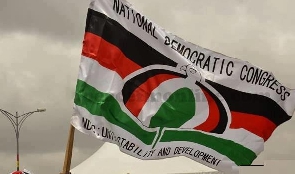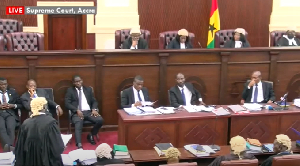Opinions of Monday, 27 March 2023
Columnist: Acham Patrick
The disregard of the NDC national leadership directive to reject all ministerial nominees an indication of disdain
For starters, it will be recalled that on 19th February 2023, the NDC General secretary issued a stern press release directing the party Members of Parliament to vote against the president's ministerial nominees.
This letter to many was not only populist but in a glaring attempt to threaten and micromanage NDC Members of Parliament from Adabraka. Nonetheless, the NDC minority as expected left the NDC leadership directive and the party’s partisan interest in the lurch.
The breaking of ranking by the minority appears to some political observers as revenge for the coup-like removal of Haruna Iddrisu and Muntaka Mubarak as minority leaders. Other political pundits see the outcome as an utter and outrageous revolt against radicalism, propagandism, and micromanaging of adults who know their left from right. The latter from a closer assay appears more plausible to me.
It will be recalled that right after the national elections of the NDC, social media was inundated with a supposed comparison of the political credentials of the NDC and the NPP national executives elected and the likely cascading effect on the outcome of the 2024 general elections.
From the myriad of comparisons, everything condescended to the fact that the NDC has elected radicals and propagandists and the NPP elected moderates and strategists as national executives respectively. Will radicalism help the NDC as a party? Your guess is as good as mine.
In every electioneering campaign, a political party either needs to reinforce, persuade and convert electorates. Reinforcement is the task of making sure partisan voters stick with the party; persuasion brings toss-up voters on board; and conversion is the act of cajoling opposition voters to switch sides. In general terms, a radicalism campaign reinforces its partisans, but cannot persuade the toss-ups, and converts the partisan voters.
If the history of elections in the fourth Republic especially from 2000 to 2020 is anything to go by, the NDC needs more strategists and moderates than radicals and propagandists. Holding all factors determining elections outcome constant from 2000 to 2020, NPP always has a default of 47% and NDC 44%.
This means in every election NDC has more work to do as compared to the NPP. NPP only needs to make sure it's based on turned out in their numbers and votes.
NDC needs to convince the floating voters as well as convert some disgruntled NPP members to vote in its favor. The current radical national executives of the NDC can only motivate its minute partisan voters but cannot appeal to the floating voters and the converts to vote in its favor. Hence, no-holds-barred radicalism and propagandism leave the NDC at a disadvantage end.
Radicalism and propagandism work best when you have a strong base but if the history of elections in the fourth Republic is anything to go by, strict radicalism will have dire consequences for the NDC come to the 2024 general elections.
In a word, the fascination of the NDC national executives with radicalism, dictatorship, propaganda, and revolutionary solutions to issues that call for dialogue, consensus, and compromise bespeaks that disunity in the party, especially the minority caucus in Parliament, will continue to be an existential threat around the neck of the party. The NDC's topsy-turvy situation will only become worse due to Adabraka's never-ending scathing letters.
The NDC leadership must understand that they cannot remotely control mature adults and seasoned politicians like programmed robots. The end result of all this is the uncomfortable reality that NPP breaking the 8 mantras will be a walk in the park.













